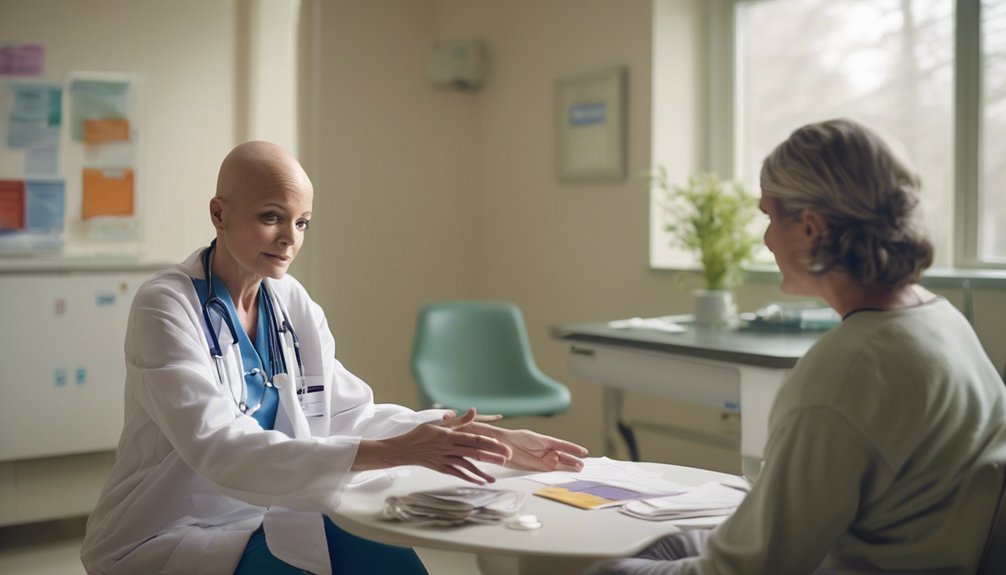When counseling cancer patients about unproven repurposed drugs, it’s vital to approach the conversation with both empathy and clarity. You’ll need to balance hope with honesty, ensuring patients grasp the potential benefits and risks of these options. They may have strong emotions and expectations, and your role is to guide them through this complex landscape. Understanding how to navigate these discussions effectively can empower patients to make informed choices about their treatment paths.
Key Takeaways
- Clearly explain the concept of unproven repurposed drugs and their potential role in cancer treatment to ensure patient understanding.
- Provide evidence-based information and emphasize the importance of high-quality studies over anecdotal claims when discussing treatment options.
- Foster open dialogue by encouraging patients to ask questions and express their concerns about the efficacy and risks of these drugs.
- Acknowledge and validate the emotional responses patients may have, including fear and uncertainty, to build trust and rapport.
- Ensure informed consent by providing comprehensive information about the drugs, their side effects, and the voluntary nature of treatment choices.
Understanding Unproven Repurposed Drugs

When it comes to cancer treatment, you might hear about unproven repurposed drugs—medications originally developed for other conditions that are now being explored for their potential in oncology.
Understanding the repurposed drug mechanisms is crucial, as these drugs may work differently than traditional therapies.
However, patient education challenges arise when discussing their efficacy and safety, particularly since evidence supporting these drugs can be limited.
Patient education is vital, especially when evidence on unproven repurposed drugs is often limited.
It’s essential to communicate clearly about the uncertainties surrounding unproven treatments, ensuring patients feel informed and empowered.
You can help by providing balanced information, encouraging questions, and fostering a supportive environment.
The Role of Evidence in Treatment Decisions
Understanding unproven repurposed drugs naturally leads to the importance of evidence in making treatment decisions. You’ll want to consider the evidence hierarchy when evaluating treatment efficacy. High-quality studies, such as randomized controlled trials, provide robust data that can guide your recommendations.
As you discuss options with patients, emphasize the significance of relying on well-established evidence rather than anecdotal claims. Compassionately informing them about the potential benefits and risks of these drugs, while acknowledging the uncertainty surrounding their use, fosters trust.
The Importance of Informed Consent
Informed consent is a cornerstone of ethical medical practice, especially when discussing the use of repurposed drugs in cancer treatment.
It’s essential to empower patients through informed decision making, ensuring they understand their options and the potential risks involved. This promotes patient autonomy, allowing individuals to take charge of their health.
Here are three key aspects to consider:
- Comprehensive Information: Provide clear details about the drug’s efficacy and side effects.
- Open Dialogue: Encourage questions, allowing patients to express their concerns and preferences.
- Voluntary Choice: Ensure that patients feel free to make decisions without pressure.
Navigating Patient Emotions and Expectations

Navigating the emotional landscape of cancer treatment can be challenging, as patients often grapple with fear, uncertainty, and hope.
You’ll encounter patient fears surrounding unproven repurposed drugs, which can heighten anxiety about treatment outcomes. It’s crucial to provide emotional support while acknowledging these feelings.
Open conversations help patients articulate their concerns, fostering a safe space for expression. Encourage them to share their expectations, as this can clarify their understanding of the treatment process.
By offering evidence-based information and compassionate listening, you can help patients manage their fears and cultivate a realistic outlook.
Your role is to empower them, ensuring they feel heard and supported throughout their journey. This emotional connection enhances their resilience during an undoubtedly difficult time.
Strategies for Effective Counseling Conversations
Addressing patient concerns requires effective communication strategies that create a supportive environment.
To foster trust and understanding, consider these approaches:
To build trust and understanding, prioritize active listening, clear communication, and empathetic reassurance.
- Active Listening: Show genuine interest by acknowledging their feelings and concerns, making them feel heard.
- Clear Language: Use straightforward terms when discussing patient education about unproven repurposed drugs, avoiding medical jargon that can confuse.
- Empathy and Reassurance: Validate their emotions and provide comfort, emphasizing that it’s okay to have questions and uncertainties.
Frequently Asked Questions
What Are Common Examples of Unproven Repurposed Drugs for Cancer?
You might come across repurposed medications like metformin, low-dose naltrexone, or chloroquine in discussions about cancer therapies. While intriguing, their efficacy isn’t fully established, so it’s crucial to approach them with caution and informed guidance.
How Can Patients Access These Unproven Treatments?
Did you know that over 60% of patients explore alternative treatments? To access unproven options, consult your healthcare provider, research clinical trials, or join support groups, ensuring you make informed decisions about your treatment options.
Are There Risks Associated With Unproven Repurposed Drugs?
Yes, there are risks associated with unproven repurposed drugs. You should prioritize patient safety and carefully consider treatment efficacy, as these medications might not provide the desired benefits and could lead to unexpected side effects.
How Do Insurance Companies View Unproven Treatments?
Insurance companies often weigh treatment efficacy against cost when considering insurance coverage for unproven treatments. They may deny claims if evidence isn’t robust, leaving you to navigate financial and health uncertainties with compassion and care.
Can Patients Participate in Clinical Trials for These Drugs?
Yes, you can participate in clinical trials for these drugs, provided you meet specific clinical trial eligibility criteria. Patient consent is crucial, ensuring you understand the risks and benefits before making such a significant decision.
Conclusion
In counseling cancer patients about unproven repurposed drugs, it’s crucial to blend compassion with clarity. While hope is important, grounding discussions in evidence helps patients make informed choices. Remember, the journey is as much about emotional support as it is about treatment options. By actively listening and fostering open dialogue, you empower patients to navigate their fears and expectations, leading them toward decisions that align with their values and understanding of their unique situations.





